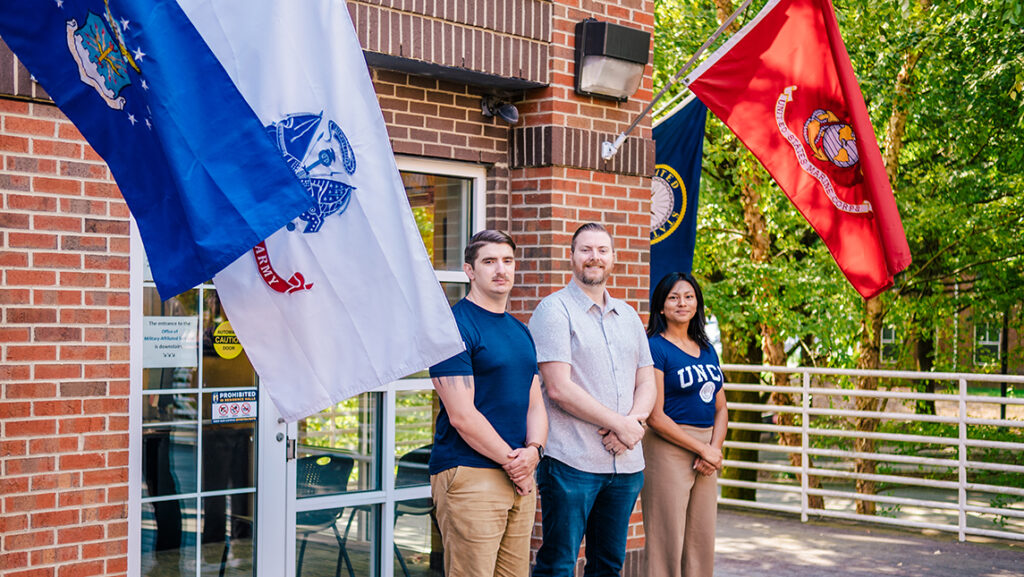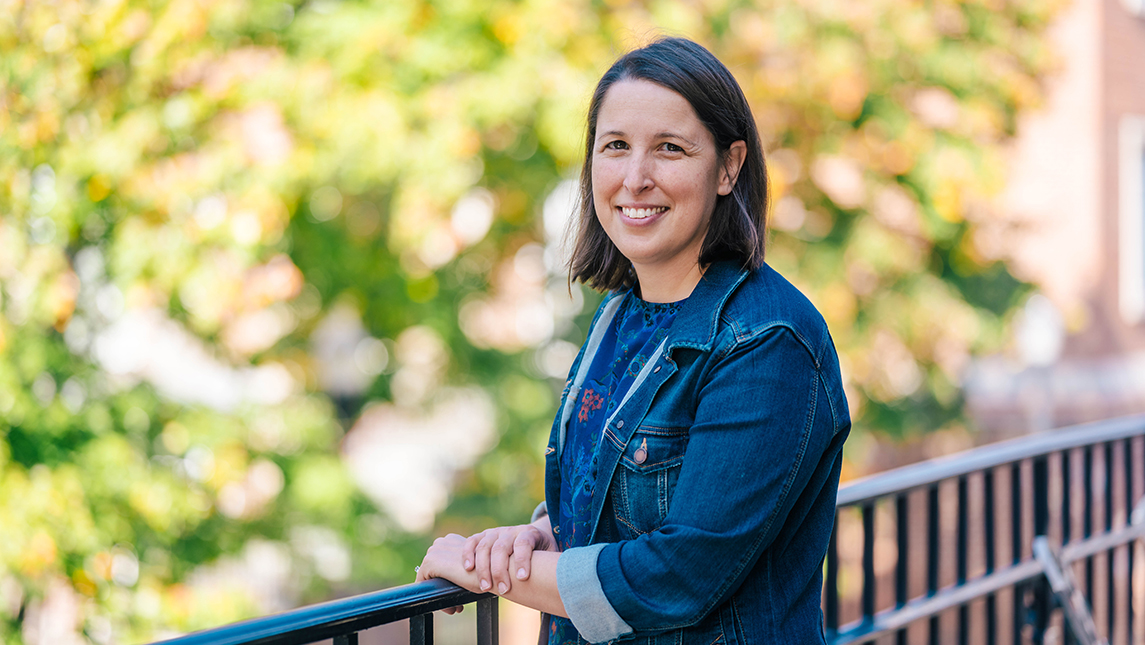North Carolina ranks among the top five states with the highest veteran population in the United States. An estimated 200,000 service members transition out of military service each year, and many choose to pursue higher education.
At UNCG, over 8%, or more than 1,500, of enrolled students are military-affiliated students, 500 of whom are veterans and service members. For the past several years Dr. Erin Reifsteck, associate professor in the Department of Kinesiology and newly appointed Faculty Fellow for Student Veteran Wellbeing, has closely studied student veterans at UNCG and at other universities across the UNC system. Her research findings are now helping inform how UNCG’s Division of Student Affairs and Military-Affiliated Services address issues impacting student veterans.
“Transitioning from military service to university life is a really important period where university faculty and staff can better support the student veteran population: not only their student success but their overall wellbeing,” Reifsteck says.
Identify and apply
Voted a Top 10 Military-Friendly School and Top 10 Military-Spouse Friendly School for the past several years, and a 2024 “Military Times” Best for Vets College, UNCG is committed to supporting its students on active duty and those transitioning out of service into academia. Reifsteck works with Chris Gregory, director of Military-Affiliated Services (MAS), to collaborate on student veteran initiatives. In 2021, Reifsteck and her research team implemented a survey, focus groups, and interviews at UNCG to better understand student veterans’ experiences and how UNCG could better support them.
“We learned that student veterans at UNCG valued being a part of a community with others and were shaped by their shared experiences through military training,” she says. “The strong peer network was lost when they left the military.”
In addition, they found that student veterans were less physically active and that it was impacting their overall well-being. Finding a sense of community was important to student veterans.
“The study we developed at UNCG led to the opportunity to do a UNC system-wide survey. We wanted to identify what the needs and concerns were beyond just our own institution, so that we could try to develop more comprehensive approaches to supporting student veterans,” Reifsteck explains.
In 2023 Reifsteck and her research partner Dr. Michael Hemphill, associate professor of kinesiology at UNCG, partnered with Bradley Wrenn, Program Manager for Military and Veterans Education at UNC System Office, to survey student veterans in the UNC system. They discovered that 50% of student veterans reported that transition from military service to student life was difficult. Many experience health concerns such as chronic pain, anxiety, depression, post-traumatic stress, migraine headaches, and insomnia.
“Student veterans have unique experiences that may relate to some of those health challenges, and these are likely a little bit different from the general student population,” she says.
Regular physical activity is known to improve these conditions, but the study revealed most student veterans experienced a decline in physical activity since their transition to out of the military.
“It’s important to remember that student veterans are not a homogenous group. They have different preferences, activities, but many of those we surveyed wanted to connect with other student veterans,” she said. “The majority were connecting through their campus’ version of UNCG’s MAS office. Although what was interesting to me as a kinesiology professor was they also talked about the campus gym as being a popular way to connect, which is consistent with some of the work we had done previously on UNCG’s campus where we identified physical activity as a way for veterans to connect with each other.”
One of the main takeaways from her research was that the student veterans specifically mentioned a need for more tailored resources for the transition from soldier to student.
“They wanted better options for connecting with other military students, more contact with faculty, and online options for resources.”
Turning knowledge into action
The two studies helped inform how MAS works with student veterans at UNCG. With Reifsteck’s help, MAS created a series of wellness workshops for student veterans last spring on topics identified in the survey. They also hosted an event designed to encourage student veterans to connect through physical activity.
“We partnered with UNCG Recreation and Wellness to gain access to the pool for a special small group activity,” she said. “We wanted to offer a fitness opportunity that could accommodate potential injuries or chronic pain that they might have, in a way that could be accessible to more student veterans.”


At another event this fall, MAS partnered with Innovate UNCG to offer entrepreneurial mindset training for student veterans. In addition, they are currently piloting an online community for student veterans named “Mail Call” where they can house resources, promote events, and encourage connection.
“The student veterans picked that name and took the lead in building the online platform. It’s similar to the concept when soldiers receive mail from loved ones and it’s like a meeting place to get your news and it’s a positive thing,” Reifsteck says. “Centering student veteran voices through the process has been extremely important. We hope that Mail Call will grow into a useful space for the students.”
Reifsteck and MAS are also increasing faculty and staff awareness of and engagement with student veterans through Green Zone training. Their goal is to enable UNCG community members to develop more knowledge and empathy for student veterans so that they can identify and connect with the appropriate resources.
“Our goal is to increase the number of faculty who go through the Green Zone training,” she says. “It’s important that our faculty are more informed about what’s going on with student veterans, the challenges they face, the strengths they bring as well as policies around attendance if they are called to duty.”
To that end, MAS and Reifsteck hosted a school-wide training with faculty in the School of Health and Human Sciences this semester and are in the process of connecting with other schools for events in the spring. In addition, they developed a military student support statement for faculty to include in their syllabi.
“It speaks specifically to military students and the services that are available on campus. It’s another part of increasing awareness both among the faculty as well as in the students who maybe we haven’t reached in some way,” Reifsteck says.
Scaling up services beyond UNCG
Gregory and Reifsteck are interested in taking their student veteran research and programs beyond UNCG to other universities.
“It would be hard to find anyone else in the UNC system that’s providing the level of comprehensive services that we do here at UNCG,” Reifsteck says, “There is so much that MAS brings to our student veterans: a beautiful physical space to connect, events co-sponsored with the Student Veteran Association, partnering with campus groups like Innovate UNCG and outdoor adventures at the Kaplan Center for Wellness to keep our students engaged and active.”
The results are reflected in the research data: 80% of the student veterans surveyed said they would recommend UNCG to other student veterans.
This spring Reifsteck and Gregory will travel to a student affairs symposium where they hope to share their research and programming with higher ed professionals from across the country. Their goal is to facilitate other campuses replicating what has worked so well at UNCG.
“We want to find ways to expand and sustain our work,” she says. “Student veterans are a growing population, and it makes sense both financially and morally to support our student veterans and make sure our universities are setting them up for success.”
Story by Alice Manning Touchette
Photography by Sean Norona





